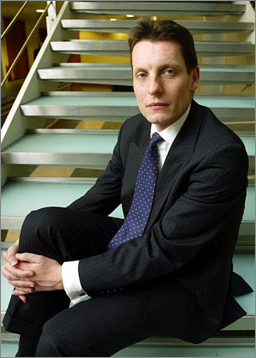Bemused by my hosts' PR-lite table manners, I started firing questions. "The bank has been around since 1672, yet has only two branches - what are your plans for expansion?"
 The most senior director present, I think it was Henry Hoare, replied: "We don't really have any. We believe we have about the right number of customers and are not interested in getting bigger just for the sake of it."
The most senior director present, I think it was Henry Hoare, replied: "We don't really have any. We believe we have about the right number of customers and are not interested in getting bigger just for the sake of it."I came away thinking "what a funny little business". If any other chief executive had said that to the financial press, he would have been put through the mangle by angry shareholders demanding more urgency.
But here's the rub: Hoare & Co is no ordinary bank. It is wholly owned by Hoare family members and is financed entirely by them on an unlimited liability basis. They are on the hook for every penny, which helps to explain the bank's statement: "We have a highly conservative attitude to risk."
So conservative, in fact, that even after more than 330 years, Hoare & Co's balance sheet is barely above £1bn: small change in the world of high finance. But the bank is still standing and, unlike some of its more ambitious competitors, has no need to pass round the hat for emergency funds.
HBOS is the latest in the queue for new money, asking investors to stump up £4bn to help it cope with "a more challenging environment ahead". Yes, this is the very same HBOS that only last summer increased its dividend to shareholders, boasting of its "strong capital generation capacity". Whoops!
As part of its embarrassing U-turn, HBOS admitted that it too had lost heavily in the whizzy securities markets, writing down nearly £3bn. So much for the fancy reputation of Andy Hornby, HBOS's chief executive, who joined the bank after cutting his teeth in management at Asda. Much more of this and he could be back stacking shelves for his local supermarket.
To be fair, Hornby's discomfort is overshadowed by that of arch-rival Sir Fred Goodwin at Royal Bank of Scotland, which needs £12bn to plug a hole in its vaults. And in comparison with the sub-prime losses clocked up by some US and Swiss banks, even RBS's weakened position appears not too bad.
How many of these bankers, I wonder, would have been quite so keen to punt on financial products they clearly did not understand if, like the partners at Hoare & Co, they had been forced to play the tables with their own chips?
How many would have been promoting no-deposit, 125pc of collateral, six-times salary, self-verifiable mortgages at the top of a rip-roaring housing market if, in making such loans, they had to put at risk their own homes?
As it was - and no doubt will be again, because the industry is blighted by boardroom amnesia - these executives were able to enjoy a gigantic one-way bet. When, instead of boring old banking, they had a wild day at the races and won, it was huge bonuses all round. On the other hand, if their gambles failed, not to worry, seven-figure salaries remained intact and, in extremis, there was always the safety net of jackpot pay-offs for destroying value.
In effect, as the Governor of the Bank of England, Mervyn King, told MPs yesterday, many compensation packages are not "in the interest of the banks themselves". For the lucky recipients, however, it's money for nothing.
Talking of which, I see that Morgan Stanley and Dresdner Kleinwort will pick up about £60m (1.5pc of the deal) for underwriting and advising on HBOS's discounted rights issue. With the shares at 486p and the rights priced at 275p, it's hard to see what level of risk these investment houses are taking to justify their handsome fee. What's the worst that can happen? No one takes up their rights and the banks are left with a 200p-a-share cushion.
As for the advice, how much does it cost to work out that if you offer £10 notes for six quid, there's a good chance you will sell out? Had Lord Stevenson, HBOS's chairman, bothered to call me I would have given him the right answer for the price of a pint, not sixty million smackers.
An unattractive combination of irresponsible lending and naked greed has landed our banks in a bad place. They are squealing for more money. They want help from the Government, special funding from the Bank of England and extra cash from their shareholders. If Oxfam turned up with a box of coins for the needy, few would be surprised if they dipped into that, too.
The banks claim that if the state fails to apply the lubrication of taxpayer-funded readies, the cogs of the entire financial system could grind to a halt. Yet, amid their pleas for first aid, the banks refuse to help themselves - and the rest of us - by lending to each other. What does that tell us?
Source > Telegraph.co.uk
Nessun commento:
Posta un commento